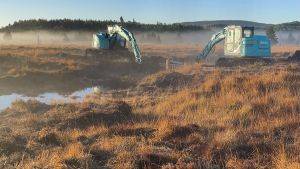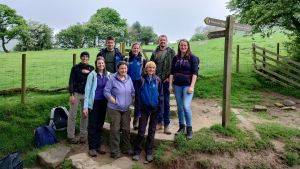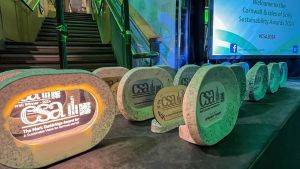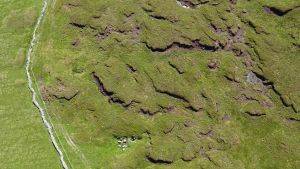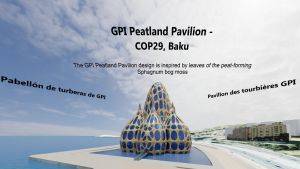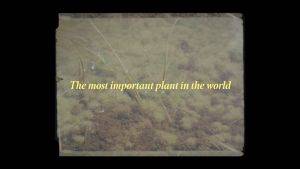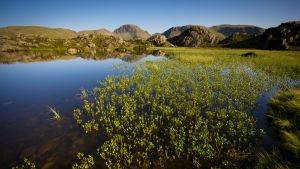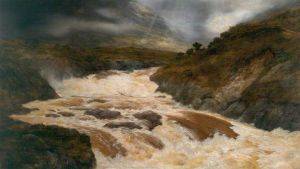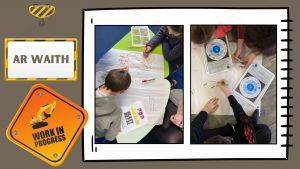Wednesday 18th September: Field visits and conference dinner
Choose from a selection of full day or half day field visits. The following half day visits can be paired:
Option J AM and Option K PM (K PM FULLY BOOKED)
Option K AM and Option J PM (J PM FULLY BOOKED)
Option L and Option J PM (J PM FULLY BOOKED)
Option L and Option K PM (K PM FULLY BOOKED)
Option M (FULLY BOOKED) and Option J PM (J PM FULLY BOOKED)
Option M (FULLY BOOKED) and Option K PM (FULLY BOOKED)
Ensure you collect a packed lunch from the conference foyer prior to departure, from 7.30am. We will provide a carton of drink but please bring your own reusable water bottle or flask to reduce our plastic consumption. A water refill station will be available in the venue foyer.
Please assemble in the coach car park outside the conference venue at least 15 minutes before your scheduled departure time for safety briefings and to ensure we keep to time for paired half day visits.
FULL DAY VISITS: CHOOSE ONE ONLY
FIELD VISIT A
Transport provided by WeGo Bus Limited in 16 seater minibuses x2.
Please note: you must provide your own high-vis vest and safety helmet for this visit.
North Dalchork: Forestry and Land Scotland forest to bog restoration
Capacity 30 people
Join Forestry and Land Scotland to explore the challenges associated with landscape scale “forest to bog” restoration in the North Highlands.
Dalchork Forest is located in central Sutherland, approximately 8 miles north of the village of Lairg. In total the forest block covers around 10,000 hectares of which around 70% was previously planted as commercial forestry plantation. The underlying soil throughout majority of the block is blanket bog, and as was the practice of the day, large tracts of this were ploughed, drained and heavily fertilised in the 1970s and 80s before being planted with Sitka spruce and Lodgepole pine. For a variety of reasons many of these crops failed to thrive and since 2014 FLS have been progressively removing large parts of these plantations and, where conditions are suitable, restoring them back to bog.
To date around 2,000 ha have been restored. Since 2014, in conjunction with our main contractor, Duncan Wemyss Ltd, FLS have been developing and refining the equipment and the methodologies used both to remove trees from these peatland sites and to deliver the crucial rewetting work.
During the visit on 18th September, attendees will get the chance to see the 216 ha South Corries site where latest specialist peatland harvesting techniques are being deployed. These have been developed to avoid causing further damage to the underlying peat and to leave the site, post tree removal, in optimal condition for rewetting. Rewetting work in the form of “ground smoothing” may also be happening at the time of the visit.
In addition to visiting the live site at South Corries, FLS also propose to show attendees a range of sites in different stages of recovery and explain how restoration techniques and equipment have evolved over the years to bring us to this point.
Travel and walk information
Travel time – Aviemore to Lairg 1hr 45min
Footwear/PPE required – sturdy walking boots or wellies. You must provide your own high-vis vest and safety helmet to be worn on the live site at South Corries. There are no toilets available on site.
Itinerary
Time Location
08.30 Depart Aviemore
10.30 Arrive FLS Depot at Lairg – Toilet stop, Safety Briefing
11.00 Depart Lairg
11.30 Arrive South Corries Peatland Harvesting site. Tour of site including peatland harvesting and rewetting demos
13.00 Lunch
13.30 Visit previously restored forest to bog sites in different stages of recovery.
15.15 Depart Dalchork
17.15 Arrive Aviemore
The visit will be led by Tim Cockerill and Sorin Both who are both Peatland Restoration Foresters working for FLS in its North Region.
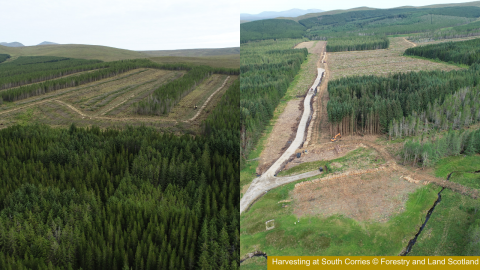
FIELD VISIT B - FULLY BOOKED
Transport provided by Aberdeen Minibus Services and WeGo Bus limited in 16 seater minibuses x2.
Corrour Estate: British Dragonfly Society and Corrour Estate
Capacity 30 people
Join staff from Corrour Estate and Peatland and Odonata Ecologist, Stephen Corcoran, to find out about dragonfly conservation, blanket bog and forest to bog restoration.
Corrour is a remote 23,000 hectare Highland estate on the edge of Rannoch Moor. The nearest public road is 17 miles from the isolated train station. Nearly 5,000 ha of the estate is woodland, 3,800 ha of commercial conifers, much planted on deep peat, and 1,200 ha of native woodland, the majority very recent. There is over 7,000 ha of open blanket bog with approximately 80% of it in a degraded state. Ecological restoration is at the heart of estate management as well as providing a traditional stalking experience.
The first forest to bog restoration project was undertaken in 2015, covering 80 hectares, with a further 332 ha identified, and work is underway to restore this. Forest management is also on-going to restore native woodland, diversify the commercial woodland and move towards a continuous cover forestry approach. Montane woodland restoration is progressing supported by a significant reduction in the density of red deer.
Restoration work of the open blanket bog habitat is targeting an initial area of nearly 700 ha to be undertaken in several phases. Work started in 2020 and is now in its third year, with over 500 ha on the road to recovery. All restoration work is supported by Peatland ACTION.
Corrour Estate was identified as one of the key sites for the rare Azure hawker in 2019. This dragonfly is restricted to the north-west of Scotland and is found in small Sphagnum pools in blanket bogs. With the climate changing, many of its breeding pools are drying out and the British Dragonfly Society is working with the Corrour Estate to create more climate resilient breeding pools.
The field trip for the IUCN UK Peatland Programme conference will include visits to three sites on Corrour Estate.
The first stop by Britain’s remotest train station, is to look at pools created for Azure hawker in an area of peatland, discussing the species’ requirements and the types of pools needed. Larval sampling can be done to look for the aquatic life stage – bring a colander and a hand lens.
You will then travel back along Loch Ossian to the Ghlas Choire site. Restoration work of this 43 ha blanket bog was completed in the winter of 2022/23. This site contained erosion gullies and peat hags, with activities including re-profiling and turfing of hags and gullies with turf dams or bunds in gullies. This is also one of 2 sites where pools are being monitored for aquatic invertebrate colonisation.
You will then take the minibuses down towards the conifer plantations in Glen Spean to look at the forest to bog work in the plantations around the Allt Loraich. The trees in this 80 ha block were cleared to recycle in 2015 using motor manual and whole tree mulching/chipping methods. Follow up work to control conifer regeneration is an ongoing issue.
Travel and walk information
Travel time: Aviemore to Corrour Station 1hr 45min
The site visits will involve walking over rough and wet peatland terrain with no paths. The first two sites involve less than 1km of walking with the forest to bog site 2km at most. Boots or wellies are required as well as full waterproofs and warm clothes. Also bring midge repellent. You will be outside all day, with no areas to shelter and no toilet access.
Itinerary
Time Location
09.00 Depart Aviemore
10.45 Arrive Corrour Station
10.50 Introduction to the estate
11.00 Pool creation and Azure hawker dragonflies
12.00 Leave station travel to Ghlas Choire site
12.30 Ghlas Choire peatland site visit & lunch
14.15 Travel to Allt Loraich site
14.45 Allt Loraich Forest to Bog site visit
16.15 Depart Corrour
17.30 Arrive Aviemore
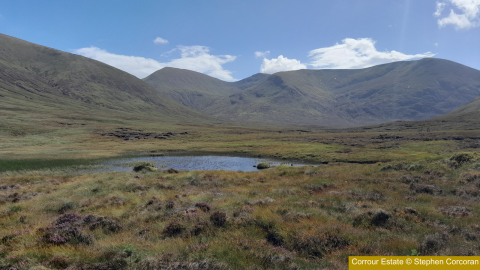
FIELD VISIT C - FULLY BOOKED
Transport provided by Bothies & Bannocks in 8 seater vehicles x2.
Parkins Moss, Muir of Dinnet NNR: NatureScot lowland raised bog restoration
Capacity 15 people
Join Nature Reserve Manager Simon Ritchie at Parkins Moss, part of the Raised Bog Special Area of Conservation designation that forms part of Muir of Dinnet National Nature Reserve.
Parkin’s moss was drained by the Victorians to try and make more grazing land for livestock. Unfortunately, the water level suddenly dropping has prevented the continued formation of peat, but NatureScot have been working to reverse this since 1999.
Learn more about the work has been undertaken to remove tree regeneration and dam up ditches to restore the hydrology of the bog. Parkins Moss is an extremely important part of the wider reserve, and is home to some special species including Northern Damselfly which is a Scottish highlands specialist.
The walk will start at 11am with a site introduction in the visitor centre. You will then head to the moss and discuss the restoration works that have been undertaken. Delegates can then enjoy their packed lunch at the moss or head back to the visitor centre with Simon, who will facilitate a concluding discussion at 2pm.
Travel and walk information
Travel time: Aviemore to Parkin’s Moss 1hr 45min
The site visit will involve walking on paths and boardwalks for around 4km in total. Boots or wellies are required as well as full waterproofs and warm clothes. Also bring midge repellent. Toilets are available at the visitor centre.
Itinerary
Time Location
09.15 Depart Aviemore
11.00 Arrive Parkins Moss
11.05 Introduction to the site in the visitor centre
11.30 Guided walk to the moss & lunch
14.00 Concluding talk at visitor centre
14.30 Depart Parkins Moss
16.15 Arrive Aviemore
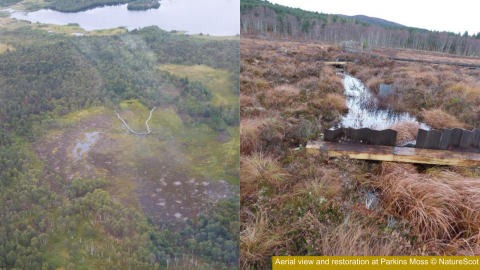
FIELD VISIT D - FULLY BOOKED
Transport provided by D&E Coaches in a 49 seater coach.
Creag Meagaidh NNR: four decades of ecological restoration from loch shore to summit plateau
Capacity 40 people
Creag Meagaidh National Nature Reserve (NNR) was one of the first places in Scotland to achieve large scale habitat restoration following centuries of land degradation. When Creag Meagaidh became an NNR in 1986 the land had been overgrazed by deer and sheep and had narrowly escaped a blanket of non-native commercial forestry plantations. Through a determined programme of reducing the large-herbivore pressure by removing the sheep and reducing the deer impacts to a sustainable level over 4,000 hectares, the habitats have been able to recover naturally with little intervention. This has benefitted the woodlands which are expanding, and the blanket bogs which are showing signs of natural recovery, and importantly has all been achieved in the presence of wild deer (without the need for any deer fences).
Today the NNR supports a broad mosaic of thriving habitats from loch shore (250m above sea level) to mountain plateau (1,130m above sea level), including upland heaths, blanket bogs, birch and alder woodland, montane willow scrub and grasslands, tall herb communities and managed fields used by our small Highland Cattle herd.
On this visit we will walk up the Coire Ardair path to experience the recovery of natural habitats, and discuss some of the management, reflecting on the importance of herbivore-habitat interactions. We will also discuss the importance of involving the local community, including our Community Deer Stalking initiative for locally living people. We will discuss the network of footpaths and visitor facilities and see how we are producing local wild venison at a small-scale.
An introduction to Creag Meagaidh NNR can be seen here: https://www.youtube.com/watch?v=3n7R7vEpeOA (embed YouTube video)
Travel and walk information
Travel time: Aviemore to Creag Meagaidh 1hr
The site visit will involve walking on paths which are steep and loose in places. Boots or wellies are required as well as full waterproofs and warm clothes. Also bring midge repellent. Toilets are available on site. For further information see Creag Meagaidh NNR - Visiting the reserve | NatureScot.
Itinerary
Time Location
09.00 Depart Aviemore
10.00 Arrive Creag Meagaidh
10.05 Meet at the Farmhouse (500m up from the main car park)
10.10 Short introduction to the NNR
11.00 Walk up the Coire Ardair path to see and experience ecological restoration and current work
13.00 Packed lunch
14.00 Deer management facilities and community stalking project
15.00 Depart Creag Meagaidh
16.00 Arrive Aviemore
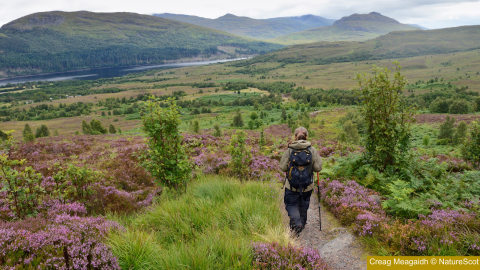
FIELD VISIT E OR F - FULLY BOOKED
Wildland Cairngorms: Lynaberack or Gaick Estate site visits
Join members of the Cairngorms Peatland ACTION team, to explore the challenges of peatland restoration in the Cairngorms at either Lynaberack or Gaick Estate (both part of Wildland Cairngorms).
Wildland has a 200-year vision of landscape-scale conservation in the Scottish Highlands. Wildland Cairngorms comprises several estates including Glenfeshie, Lynaberack and Gaick. On these estates work is ongoing to help promote the recovery of habitats and species. Wildland is a key partner of Cairngorms Connect and is contributing significantly to the Cairngorms Connect rewilding and habitat restoration targets. With support and funding from the Cairngorms National Park Authority (CNPA) Peatland ACTION Programme (Cairngorms Peatland ACTION) over 1,000 ha of peatland has been put into restoration management in the Wildland Cairngorms area so far. Wildland Cairngorms is also an outstanding example of native woodland recovery through deer management and as well as looking at peatland sites there will be opportunities to look at the natural regeneration of native woodlands that has occurred and how the two (peatlands and woodlands) interact in this landscape.
Cairngorms Peatland ACTION is a Peatland ACTION delivery partner which is helping landowners across the Cairngorms National Park to develop, design and deliver peatland restoration projects. The team also runs a New Entrant Programme that helps new contractors to upskill and gain experience and competence in peatland restoration.
At both sites, there will be opportunities to learn about how the Cairngorms Peatland ACTION team develop, design and deliver peatland restoration projects.
FIELD VISIT E - FULLY BOOKED
Transport provided by Leathan Taxis and Allan & Black in 16 seater minibuses x2.
Lynaberack (500 – 600m above sea level)
Capacity 24 people
At Lynaberack participants will be treated to a varied day, which will including visiting two recently completed erosion projects and one challenging area of erosion that is yet to be restored. Participants will be invited to discuss different restoration approaches and the challenges and benefits of these. There will be opportunities to look at areas of erosion that have been restored by machine (primarily hag reprofiling and gully blocking) and by hand labour (i.e. timber dams, sack dams, coir mesh, etc.) and areas that are yet to be restored. These sites are also a prime example of the challenges faced when accessing and restoring remote high altitude upland sites.
Travel and walk information
Travel time: Aviemore to Lynaberack 1hr
Sturdy walking boots or wellies and suitable outdoor clothing are required. This visit will involve much walking over uneven and difficult ground so good physical fitness is required. There are no toilets available on site.
Itinerary
Time Location
09.00 Depart Aviemore
10.00 Arrive Lynaberack Estate (Tromie Dam)
10.00 Steep hike up hill to restoration site (~30 minutes)
10.30 Site visit to Lynaberack Site 4 (completed in 2024).
12.30 Lunch (please collect from conference venue foyer prior to departure)
13.00 Site visit to Lynaberack Site 5 (not yet restored)
14.00 Site visit to Lynaberack Site 3 (completed in 2023)
15.00 Return to minibuses at Tromie dam, via Sites 5 & 3 and steep decent downhill
16.00 Depart Lynaberack
17.00 Arrive Aviemore
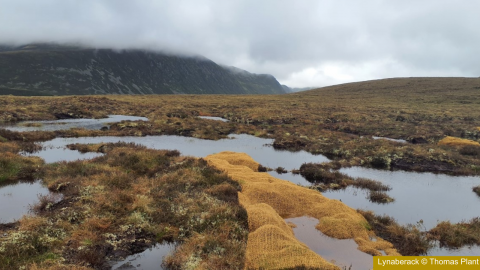
FIELD VISIT F - FULLY BOOKED
Transport provided by Highland Yaks and Macdui Adventures in 8 seater vehicles x3.
Gaick (450 – 600m above sea level)
Capacity 31 people
At Gaick the main focus will be looking at a very recently completed peatland restoration project which has machine work (primarily gully blocking, hag reprofiling and arc bunding) and a wide variety of hand labour techniques, including timber dams, stone dams, leaky bogwood / stone dams, stone spillways, sack dams, coirmesh and cottongrass plug planting. This site is notable for the high level of naturally recovering common cottongrass. As at Lynaberack, participants will be invited to join in with group discussions on different restoration approaches and the challenges and benefits of these.
Travel and walk information
Travel time: Aviemore to Gaick 1hr 30min
Sturdy walking boots or wellies and suitable outdoor clothing are required. This visit will involve much walking over uneven and difficult ground so good physical fitness is required. There are no toilets available on site.
Itinerary
Time Location
09.00 Depart Aviemore
10.30 Arrive Gaick Estate
10.30 Site visit to Gaick Site 1 (completed in 2024)
12.30 Lunch (please collect from conference venue foyer prior to departure)
13.00 Continue site visit to Gaick Site 1 (completed in 2024)
15.30 Depart Gaick
17.00 Arrive Aviemore
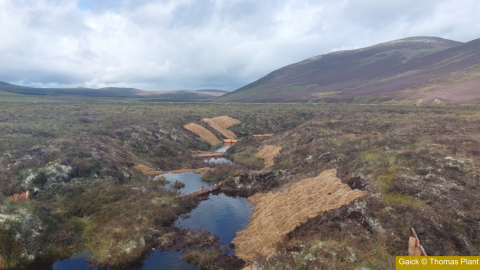
HALF DAY VISITS: CHOOSE ONE ONLY
FIELD VISIT G
Transport provided by D&E Coaches in a 49 seater coach.
Allargue Estate: Corr Riabhach project site visit
Capacity 30 people
Join Cairngorms Peatland ACTION and Adrian Walker of the Allargue Estate Partnership to explore the challenges of restoring an actively eroding, high altitude (760m) peatland site within the Cairngorms National Park.
Allargue Estate is located in upper Donside, some 14km west of Strathdon, where they use a blended management approach that seeks to balance traditional land management and sporting activities. Part of this mix of activities is the delivery of peatland restoration. In recent years the Estate has trialed some small-scale peatland restoration work ‘in-house’, with the view to delivering future restoration on a larger scale.
The Corr Riabhach demonstration site (c.12ha) is representative of similar areas of degraded peatland found elsewhere on Allargue Estate (as well as on neighbouring Estates), and the project was established to help foster a better understanding of the real costs associated with restoring challenging sites such as this.
The north-eastern section of the project site falls within the Ladder Hills SSSI/SAC, notified for its upland assemblage (SSSI), alpine heath (SSSI/SAC), subalpine dry heath (SSSI/SAC), blanket bog (SSSI/SAC), and minerology of Scotland (SSSI) natural features.
During the visit you will hear about some of the challenges that this work presents, including the treatment of complex erosion features, limited machine access, working at altitude over autumn and winter, and a significant hand-work component using imported materials. The project also presented an opportunity to trial the use of new wool products, as well as other novel interventions such as peat-filled ‘strudels’, which will allow the Cairngorms peatland team to monitor the efficacy of these approaches to the benefit of the wider Cairngorms Peatland ACTION programme.
Travel and walk information
Travel time: Aviemore to Allargue 1hr
Sturdy walking boots or wellies and warm waterproof outdoor clothing are required. This visit will involve walking 30min each way up a steep hill track. There are no toilets available on site.
Itinerary
Time Location
09.00 Depart Aviemore
10.00 Arrive lay-by near Lecht Ski Centre car park
10.00 Walk to site
10.30 Arrive Corr Riabhach
12.30 Return from site
13.00 Depart lay-by
14.00 Arrive Aviemore
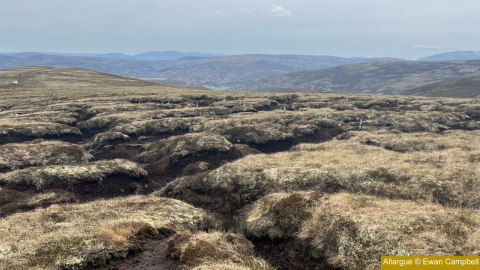
FIELD VISIT H - FULLY BOOKED
Transport provided by D&E Coaches in a 16 seater minibus.
RSPB Abernethy: Bile Buidhe blanket bog site visit
Capacity 14 people
Abernethy NNR is located in the northern Cairngorms and has been managed by the RSPB since the 1980s. Most widely known for its remnant Caledonian pine forest, the reserve also encompasses a large amount of mountainous terrain and stretches as far west as Ben Macdhui. A significant amount of the upland area to the east of the reserve is comprised of blanket bog, of which around 1400ha is heavily eroded.
Previous peatland restoration projects on the reserve have focused mainly on the area around Bynack More. In 2023 the RSPB started a large-scale peatland restoration project on the eastern side of the reserve on Bile Buidhe. This project saw an area of 75ha restored: the site had some of the most complex and technical restoration work found in the Cairngorms and a range of restoration techniques were needed to get the site on the road to recovery. This year a further 50ha will be restored with work starting in August 2024.
Join the site visit at Abernethy NNR with Project Manager Sally Phillips and Principal Ecologist Neil Cowie to look at the results of last year’s work, what went well and what didn’t. During the site visit we will explore some of the challenges that the project presents, including the treatment of complex erosion features, limited machine access, working at altitude over autumn and winter, and a significant amount of handwork. There will also be an opportunity to see some peatland restoration in action, with this year’s restoration work well underway.
Travel and walk information
Travel time: Aviemore to Abernethy Forest Lodge 30min
Sturdy walking boots or wellies and warm waterproof outdoor clothing are required. This visit will involve walking 6-7km and a 300m ascent over rough (sometimes wet and boggy) ground. There are no toilets available on site.
Itinerary
Time Location
08.30 Depart Aviemore
09.00 Arrive Abernethy Forest Lodge
09.05 Transfer to 4x4s for travel to site
Walk and talk including lunch break
14.00 Depart Abernethy
14.30 Arrive Aviemore
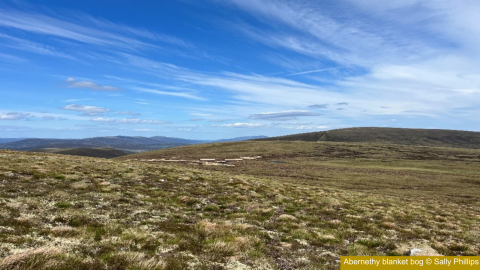
HALF DAY VISITS: CHOOSE ONE VISIT OR TWO THAT CAN BE PAIRED
The following visits can be paired with each other:
Option J AM and Option K PM (KM PM FULLY BOOKED)
Option K AM and Option J PM (J PM FULLY BOOKED)
Option L and Option J PM (J PM FULLY BOOKED)
Option L and Option K PM (K PM FULLY BOOKED)
Option M (FULLY BOOKED) and Option J PM (J PM FULLY BOOKED)
Option M (FULLY BOOKED) and Option K PM (FULLY BOOKED)
FIELD VISIT J: AM OR PM (PM FULLY BOOKED)
Transport provided by D&E Coaches in a 49 seater coach
Cairngorm Mountain Area: Forestry and Land Scotland site visit
Please note: you must provide your own high-vis vest and safety helmet for this visit
Capacity 30 people in AM group, 30 people in PM group
Join Isabelle Destor, Peatland Restoration Forester at Forestry and Land Scotland (FLS), to see a unique, high-altitude area of restored peat haggs. The site is at the foot of the busy Cairngorm Mountain Scotland (CMS) ski centre in the Cairngorm National Park and the surrounding area is popular for tourism and outdoor activities. The 60ha site (58ha managed by FLS and 2ha by Highlands and Islands Enterprise) is located within FLS Glenmore Forest, 10 miles from Aviemore.
The Cairngorm site has a suite of European and National designations attached to it as part of the Cairngorms Special Area of Conservation (SAC). Some of the qualifying features at European level include the “wet heathland with cross-leaved heath” and “blanket bogs”. The site is also designated at national level for its landscape value as part of the Cairngorm Mountain National Scenic Area (NSA).
We will look at the challenges of re-profiling a complex network of small, old, eroded peat haggs/gullies interconnected with near-natural habitats, as categorised under the Peatland Code. There will be a chance to discuss the difficulties of adapting work for high altitude with changeable and challenging weather such as snow and high winds. The effectiveness of restoration methods in preventing future peat hagg erosion will be assessed through a long-term monitoring program.
We will also discuss the importance of working in partnership with Cairngorm Mountain Scotland to gain access to the site. Given the busy surroundings, public safety was an important consideration, leading to an additional challenge of a limited time window permitted to carry out the works.
Travel and walk information
Travel time: Aviemore to Cairngorm ski area car park 30min
The site may be live during the visit so please come prepared with your own high-vis vest, safety helmet and sturdy boots with good ankle support. Waterproof boots or wellies are highly recommended along with warm waterproof clothing. The walk is not strenuous but underfoot conditions can be very wet. Walking time will be 20-30 minutes in total. There are toilets available in the car park.
Itinerary AM group
Time Location
09.30 Depart Aviemore
10.00 Arrive Cairngorm ski area
10:05 Site visit
12.00 Depart Cairngorm ski area
12.30 Arrive Aviemore
Itinerary PM group - FULLY BOOKED
Time Location
13.00 Depart Aviemore
13.30 Arrive Cairngorm ski area
13.35 Site visit
15.30 Depart Cairngorm ski area
16.00 Arrive Aviemore
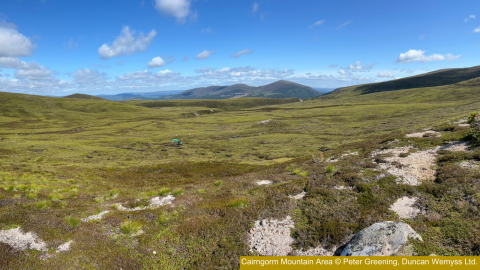
FIELD VISIT K: AM OR PM - PM FULLY BOOKED
Transport provided by King Coaches (First Aberdeen) in 16 seater minibuses x2.
Inshriach Forest: Forestry and Land Scotland site visit
Capacity 30 people in AM group, 30 people in PM group
Join Russell Anderson of Forestry and Land Scotland to visit ongoing peatland and river restoration work in the heart of the Cairngorms. The Allt a’ Mharacaidh area of Inshriach Forest is part of the Invereshie and Inshriach National Nature Reserve, River Spey and Cairngorms Special Areas of Conservation and is part of Cairngorms Connect, Britain’s largest ecological restoration project.
Located in the heart of the Cairngorms around 10km south of Aviemore, the site contains a mixture of habitats including bog woodland and very wet mires (2 of the SAC qualifying features). The site has been impacted by historical tree felling and planting of non-native species and was first partially restored under the LIFE Wet Woodlands Project in the early 2000’s. At that time there was significant felling of non-native trees and drain blocking. Follow up work since then has involved revegetating an area of exposed peat, and work to naturalise the main watercourse through the site (which had been impacted by use in logging operations in the past).
The bog woodland habitat here is very rare in Scotland, being restricted to very wet bogs which are barely suitable for tree growth. Succession to woodland is only partial, due to some areas of the bog being too wet to support trees. This results in an open canopy woodland of (often very old) stunted trees. The trees germinate on drier micro sites, grow very slowly due to the wet and nutrient poor conditions and often sink or fall over once they reach a critical size. While much of the surrounding forest has been planted, the trees in the bog are remnants of the original native Caledonian Forest that once covered this site.
We will be looking at the challenges of combining peatland restoration work alongside river restoration work and commercial forestry, all in a highly designated and sensitive landscape.
Travel and walk information
Travel time: Aviemore to Inshriach 30mins
Waterproof boots or wellies are highly recommended along with warm waterproof clothing. The walk is not strenuous but underfoot conditions can be very wet. Walking time: 30-40 minutes total. There are no toilets available on site.
Itinerary AM group
Time Location
09.30 Depart Aviemore
10.00 Arrive Inshriach
10:05 Site visit
12.00 Depart Inshriach
12.30 Arrive Aviemore
Itinerary PM group - FULLY BOOKED
Time Location
13.00 Depart Aviemore
13.30 Arrive Inshriach
13.35 Site visit
15.30 Depart Inshriach
16.00 Arrive Aviemore
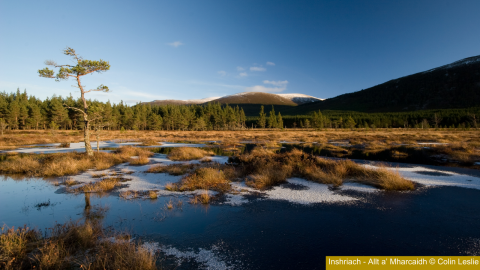
FIELD VISIT L: AM ONLY
Transport provided by WeGo Bus Limited in a 30 seater coach.
River Peffery: Re-meandering project site visit
Capacity 30 people
The Peffery Restoration Project has re-meandered previously a straightened, deepened section of the Peffery River close to the small settlement of Fodderty.
The new channel is 30% longer than the original channel, increasing in length from 450m to 600m. In addition, a total of 6.5 ha of new floodplain habitat has been created. New floodplain habitat comprises a mosaic of wetland, swales, backwaters, marshy grassland, improved grassland reverting to a more natural vegetation composition, and a combination of planted / regenerating trees and scrub.
Trees removed to create the new channel have been recycled for use within the restoration site as large woody debris structures or tie-in bank protection. These features have already encouraged the formation of fish spawning habitat and structural diversity whilst having the additional benefit of decreasing diffuse pollution. This offers a host of ecological and geomorphological benefits lending itself to a stable and sustainable riparian ecosystem. The Peffery River hosts a range of protected species including Atlantic salmon, otter, kingfisher and eels which will benefit from increased habitat, reduced pollution and improved geomorphology of the river.
The visit will be hosted by Richard Lockett (Lockett Agri-Environmental) and supported by Dr Hamish Moir (cbec eco-engineering).
Travel and walk information
Travel time: Aviemore to Fodderty 1hr 10 min
Waterproof boots or wellies are highly recommended along with warm waterproof clothing. The walk is not strenuous but underfoot conditions can be very wet. Walking time: 30-40 minutes. There are no toilets available on site.
Itinerary
Time Location
08.00 Depart Aviemore
09.10 Arrive Fodderty Cemetery
09.25 Walk and talk
11.30 Depart Fodderty
12.40 Arrive Aviemore
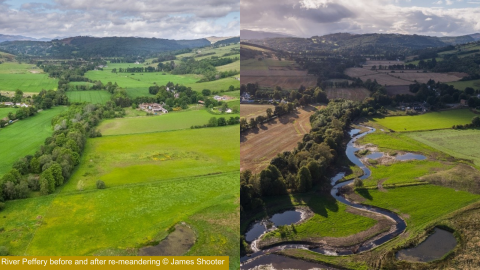
FIELD VISIT M: AM ONLY - FULLY BOOKED
Transport provided by D&E coaches in a 22 seater minibus
RSPB Abernethy: Loch Garten bog woodland site visit
Capacity 20 people
Abernethy NNR is located in the northern Cairngorms and has been managed by the RSPB since the 1980s. Recently, the RSPB have been restoring peat beneath the trees: historically, deep drains were cut to allow for tree planting. In some of these areas, deep peat is present, and the drains are actively draining large areas of bog woodland habitat.
Following a successful trial project to block drains using small excavators near Loch Garten in 2022, a second project was delivered in 2023 using a range of techniques including timber dams, peat dams and wave dams, and zipping of drain lines. The work is much slower than traditional drain blocking as the excavator moves slowly through the forest to avoid causing damage to trees. The ground vegetation is also much thicker making drain lines harder to spot and follow. The result of this work is evident very quickly with new bog pools forming behind dams almost immediately, and the water levels rising in the forest around the blocked drains.
Meeting at the Loch Garten Nature Centre Car Park, our community ranger Sarah White will give you an introduction to Abernethy Nature Reserve and the work that the RSPB does. RSPB Abernethy Field Officer Megan Jones will lead a visit to the 2023 project site to look at the results of the work, discuss the long-term goals for the project and talk about the importance of restoring this habitat.
Travel and walk information
Travel time: Aviemore to Loch Garten 30min
Waterproof boots or wellies are highly recommended along with warm waterproof clothing. Walking distance: 1-2km on wet, uneven groun. There are toilets available in the Loch Garten Nature Centre.
Itinerary
Time Location
08.30 Depart Aviemore
09.00 Arrive Loch Garten
09.05 Introduction to Abernethy
09.30 Visit to 2023 project site
12.00 Depart Loch Garten
12.30 Arrive Aviemore
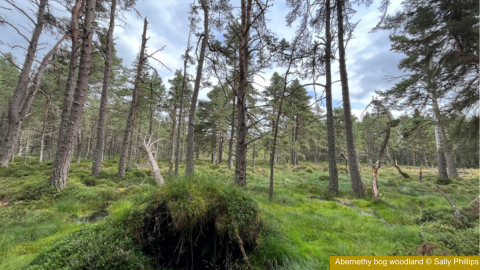
7pm – 11.30pm Conference dinner, networking and entertainment
Join us for a three course dinner and entertainment from ceildih band The Haggis Chasers. The dress code for dinner is smart/casual, but feel free to bring your tux or wellies if you prefer!
Exploring Aviemore
There are plenty of options for exploring the area local to the conference venue, including nearby nature reserves.
Craigellachie National Nature Reserve
If you’ve booked a half day field visit on Day 2 of the conference and have some time to spare, you might like to visit Craigellachie National Nature Reserve. It’s situated just a 5-minute walk from the Macdonald Aviemore Resort and the beautiful photo on the conference webpages was taken at the reserve, looking across to the Cairngorms Mountains. Managed by NatureScot, the reserve is home to a nationally important upland birch woodland. There are four trails within the reserve, varying in length from 0.7 – 4.4km. Tracks are fairly steep in some places and rough and muddy in others. Toilets are available at the conference centre or the nearby youth hostel.
Invereshie and Inshriach National Nature Reserve
This reserve is a 20-minute drive (10km) from Aviemore. At 3,000 hectares, it includes a host of habitats including ancient pinewoods and blanket bog. It is also well known for having what is thought to be the only natural tree line in the UK. The nearest bus stop and train stations are 10km from the reserve and access is via a minor road. For more information, see Invershie and Inshriach NNR – Visiting the reserve. There are no waymarked trails on the reserve but a well-defined path from the car park follows the Allt Ruadh (‘red burn’) for 6 km to the summit of Sgòr Gaoith, at 1,118 metres. If you don’t want such a long strenuous trip, a 30-minute walk will give you a taste of how the reserve changes from valley to open hill. It will also give you superb views westwards over Glen Feshie to the Monadhliath hills beyond. The path is mostly well surfaced but steep with loose stones in places. Higher up, it’s prone to erosion. Please help by keeping to the centre of the path.


